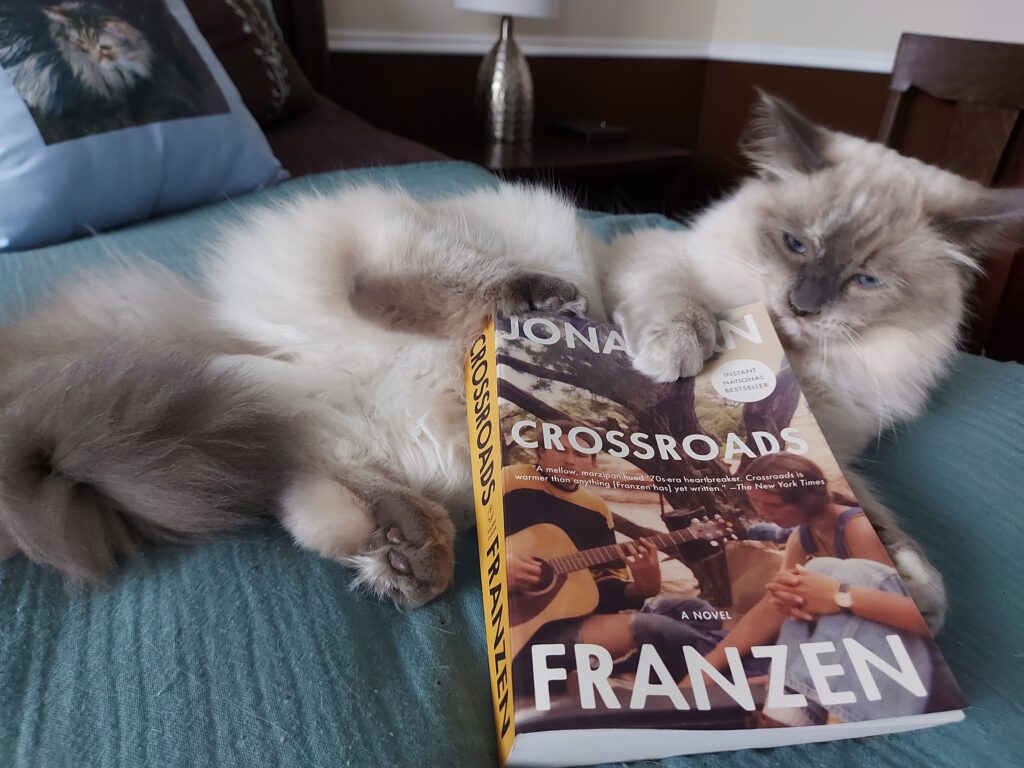Crossroads by Jonathan Franzen

Jonathan Franzen’s novels may not be for everyone as they are more character-driven then plot-driven. Crossroads is no exception as the main events take place on a single day, December 23, 1971, with introspective flashbacks that allow readers to get to the heart of each character. That is what I appreciate about Crossroads, by no means a joyous read, which is the opportunity to dive deep into the psyche of the richly imagined and authentic characters created by Franzen.
Crossroads is about family, specifically the Hildebrandt family, comprised of Russ, a former Mennonite who works as an associate minister at a church in a Chicago suburb, his wife, Marion, and their children (from oldest to youngest) Clem, Becky, Perry and Judson. The novel is about how little parents know their children, and how little children know their parents. It is about how children rebel against their parents while not realizing they are more like their parents than they want to be. It is about a failing marriage and how its failure impacts the family unit. Like the title suggests, each of the characters (except youngest child Judson) are at a crossroads in their lives.
Crossroads, for someone like me who has personal experience with the hypocrisy of religious people, is also about the failings of religion. How can we expect a minister to provide religious guidance when he is not-so-secretly lusting after another woman, trying to entice her into an affair, while at the same time getting ready to leave his wife? Russ is not oblivious to his failings as a man of God, but instead of choosing the “righteous” path, he chooses to pursue adultery. Russ is also narcissistic and petty. The novel takes its title from the youth group that Russ helped create, Crossroads, and which he is eventually pushed out of because the new hippyish, counterculture members of the group find him creepy and his preachy style off-putting; they prefer the younger leader of the youth group, Rick Ambrose. Russ spends a lot of novel stewing in his hatred over the popular, charismatic Rick, who Russ has refused to speak to for the last three years.
Marion is perhaps the most sympathetic character in the novel, but she is not without her frustrations. As a naïve young woman, long before she met Russ, she was enticed into an affair with a much older married man, who eventually abandoned her. She then dealt with an unwanted pregnancy, sexual assault, and being institutionalized. She turned to Catholicism for comfort and absolution, but her Catholic guilt makes her see herself as a sinner deserving of everything she suffered and not as a victim. She is also fed up with her marriage to Russ; she is not oblivious of his pursuit of another woman. She decides that she wants to be young Marion again, the Marion who gives zero fucks about being a sinner because she wants to live. Marion starts chain-smoking like a fiend in order to lose the weight she put on while married to Russ and makes plans to rekindle her relationship with the guy she had an affair with when she was younger.
Clem, despite being raised in a religious household, does not believe in religion; instead, he believes in moral absolutism and resolves to drop out of college so that he can be drafted into the army. This would be admirable if it was not mainly about sticking it to his father. Pretty, popular Becky, who was once close to Clem, joins Crossroads to steal a hot musician from his girlfriend, and ends up finding both the counterculture and religion in the process. Perry wants to be a better person, but he is in too deep with drugs and ends up massively screwing things up for everyone. Judson does not get a turn to share his perspective, probably because at nine-years-old he is not problematic (yet).
Crossroads, like the HBO show The White Lotus (which I recommend you watch), shows people how they really are: complicated, messy, and not always likeable. Sure, it can make for an uncomfortable reading experience, but I have always been the kind of person who is curious about other people, whether they are agreeable or not. I do not like most of the Hildebrandts, but I am invested in their lives now. Crossroads is part of a planned trilogy, and you can bet your bottom dollar I will be reading the next two novels about this family.